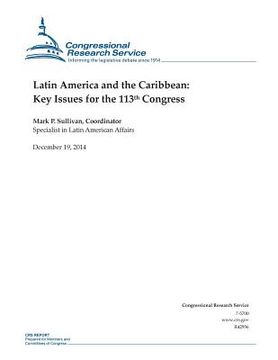Synopsis "Latin America and the Caribbean: Key Issues for the 113th Congress"
Geographic proximity has ensured strong linkages between the United States and the Latin American and Caribbean region, with diverse U.S. interests, including economic, political, and security concerns. U.S. policy toward the region under the Obama Administration has focused on four priorities: promoting economic and social opportunity; ensuring citizen security; strengthening effective democratic institutions; and securing a clean energy future. There was substantial continuity in U.S. policy toward the region during the first six years of the Obama Administration, which pursued some of the same basic policy approaches as the Bush Administration. Nevertheless, the Obama Administration made several significant policy changes, including an overall emphasis on partnership and shared responsibility. Moreover, just after the end of the 113th Congress in December 2014, President Obama unveiled a new policy approach toward Cuba that substantially broke with the long-standing U.S. sanctions-based policy and moved toward a policy of engagement. U.S. policy toward the region is conducted in the context of a Latin America that has become increasingly independent from the United States. The region has diversified its economic and diplomatic ties with countries outside the region. Over the past few years, several Latin American regional organizations have been established that do not include the United States, including the Community of Latin American and Caribbean States (CELAC) designed to boost regional integration and cooperation. While to some extent CELAC's establishment reflected declining U.S. influence in Latin America, the United States still remains very much engaged in the region bilaterally and multilaterally. A looming challenge for the United States was how to deal with the next Summit of the Americas, scheduled to be hosted by Panama in April 2015. Cuba had expressed interest in attending the sixth summit in 2012 in Colombia, but ultimately was not invited to attend. The United States and Canada had expressed opposition to Cuba's participation. Previous summits had been limited to the hemisphere's democratically elected leaders. Many Latin American countries vowed not to attend the 2015 summit unless Cuba was invited to attend, and as a result, Panama announced in August 2014 that it would invite Cuba to the summit. In December 2014, as President Obama was announcing a new policy approach toward Cuba, the White House announced that the President would participate in the summit, but emphasized that human rights and democracy would be key summit themes.

